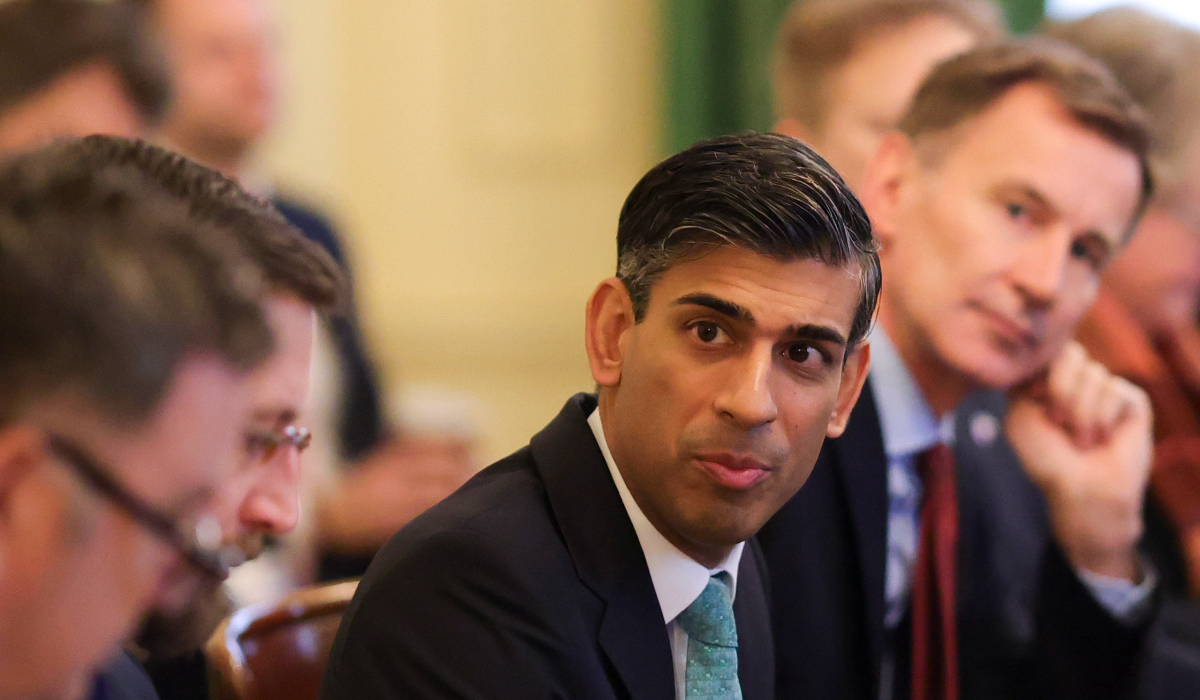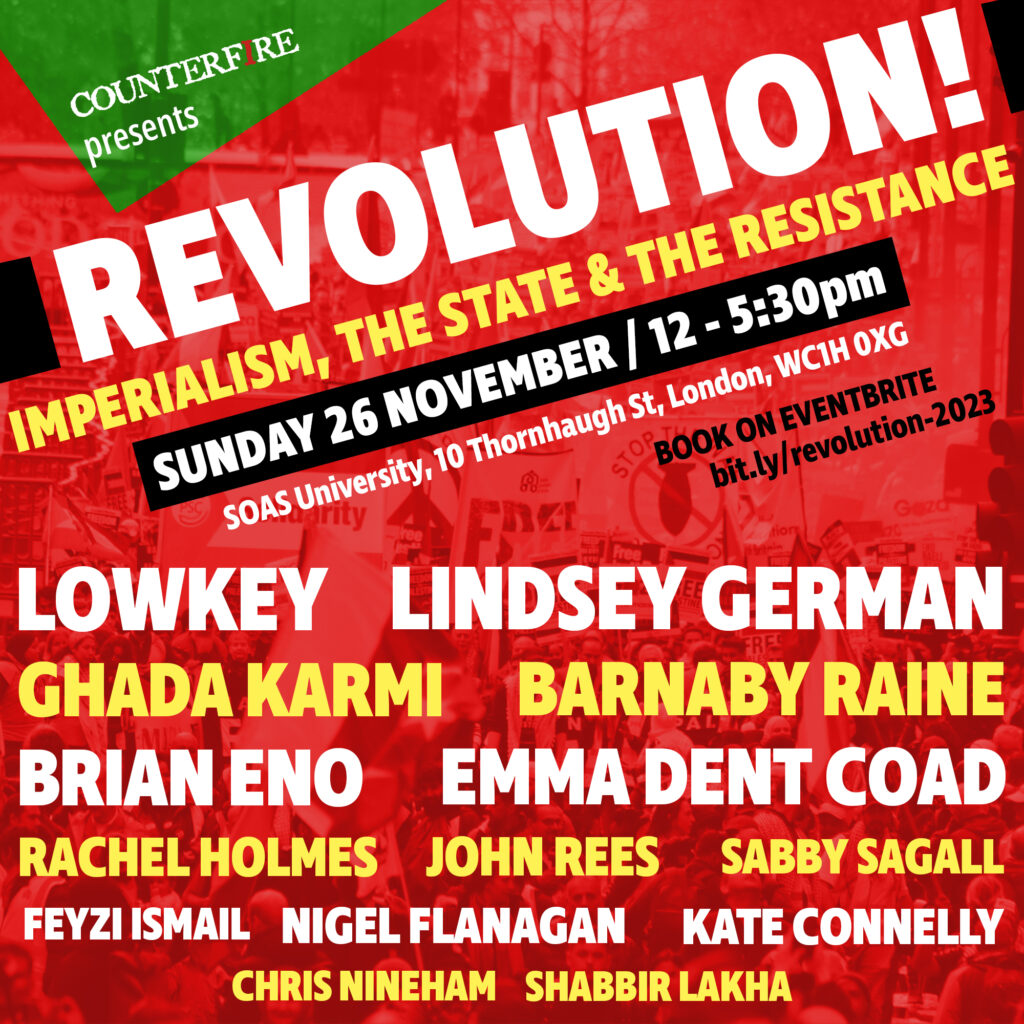 Sunak and Hunt at Downing Street, December 2022. Photo: Flickr/Simon Dawson
Sunak and Hunt at Downing Street, December 2022. Photo: Flickr/Simon Dawson
Lindsey German on political crisis and the democratic deficit
The scenes we are seeing from Gaza on a daily basis are evidence of the vilest war crimes – and our government is complicit in allowing Israel to continue its attack. The World Health Organisation has described the Al Shifa hospital in Gaza City as a ‘death zone’. Patients and medical staff have been forced out of the hospital which is supposed to house a command-and-control centre for Hamas – for which no evidence has been found. The distressing scenes are fuelling a mass movement worldwide. But politicians are for the most part deaf to the calls, including from the UN, for an immediate ceasefire.
The British political establishment still doesn’t get the movement over Gaza. It cannot compute that huge numbers are turning out to protest on demonstrations, school strikes, days of action, vigils, boycott events. Majority public opinion favours a ceasefire. Yet a majority of our political representatives refuse to call for one, doubling down on the support they have given Israel’s war crimes over the past weeks.
Last week they voted down a Commons amendment calling for a ceasefire despite the gruesome and heart-breaking scenes coming out of Gaza. But instead of dealing with the increasingly brutal Israeli actions, including the targeting of hospitals and the sick, they urge us to not look there but look somewhere else.
So the arrests of over 100 far-right protesters are equated with a tiny number of placards that are antisemitic and which the organisers have nothing to do with.
When I was interviewed on Sky before the local demonstrations on Saturday this was one of the main lines of questioning. What about the placards, are the marches threatening to the Jewish community, isn’t this all about antisemitism? There seems little understanding that when there is such a big movement and so much anger at what is happening there will be a very small minority who draw the wrong conclusions and blame Jewish people rather than the Israeli government for what is going on.
But the overwhelming message is to end the assault on Gaza. This is not a religious or racial conflict, it is a political and humanitarian issue. The many Jewish people who go on the marches understand this, but it suits our rulers to try to pose it in these terms rather than to look at the role of Israel in its oppression of the Palestinians.
Such is the movement that 56 Labour MPs rebelled against Keir Starmer and voted for the SNP motion calling for ceasefire. Starmer’s support for Israel has backfired on him and this is a significant rebellion, including eight shadow front bench members. The anger at those who didn’t do that, such as my MP Meg Hillier, is palpable. There is no democratic accountability for these MPs, especially in areas with strong Labour majorities, so they just ignore public opinion.
That has prompted pickets and protests outside their constituency offices. How have the MPs responded? By accusing protesters of violence and intimidation, and in the case of women MPs, misogyny. This is the claim of Siobhan McDonagh, a south London MP. It is a complete travesty. And it tells you a great deal about the mindset of some Labour MPs that they paint themselves as the victims of their constituents and of the Gaza crisis. In a democracy it is right that those who elect MPs should have the right to make their feelings heard if those MPs don’t represent them.
That isn’t violent or intimidating or misogynistic – it’s politics, and MPs who take fat salaries and expenses should be prepared to accept it if they join in backing an Israeli war which is condemned by the UN, by most countries across the world, and by a majority of people in Britain.
Palestine is the sharpest element of the political crisis, with Sunak forced to sack his Home Secretary, Suella Braverman in a standoff brought to its head by the Palestine marches. Starmer’s refusal to back a ceasefire has brought the greatest political crisis of his leadership, and the threat of losing normally safe Labour seats in the election. It simply beggars belief that a Labour opposition leader would back the deliberate targeting of a whole population by a far-right Israeli government.
But it is not the only element of the political crisis. Sunak is banking on his ‘stop the boats’ campaign as the main way of galvanising flagging Tory support and appeasing his right wing. The Supreme Court Rwanda judgement, which found against his government, is now to be overturned by a law passed through this decrepit parliament which will decree that Rwanda is ‘safe’ for asylum seekers, despite evidence to the contrary. Like Humpty Dumpty in Through the Looking Glass, words mean exactly what he chooses them to mean.
If that legislation passes, he will hail it as a victory for his policies, if it is blocked in the House of Lords, this will be a core part of his electoral campaign – and Labour will be dragged even deeper into the sordid bidding war about refugees and asylum seekers.
The unelected Sunak last week appointed the unelected and failed former prime minister Lord Cameron as his Foreign Secretary. The man who led the bombing of Libya with such disastrous consequences will follow the line of supporting Israel and of backing US foreign policy come what may.
Then there is the Autumn Statement this week where right-wing Tories are urging cuts in inheritance tax – which will benefit a tiny number of already rich people – and business tax, while maintaining existing tax thresholds that hit working-class people hard. There will also be attacks on the sick and unemployed, as the Tories try to force people back to work by cutting benefits. Britain is the only country in the G7 whose workforce is still below pre-pandemic levels, and it wants to use stick rather than carrot to change this.
So there we have it. A country where wages have fallen over a decade and a half, where spending is low because of a continuing cost of living crisis, a country whose ruling class is addicted to war and militarism, presided over by a corrupt and divided government and a feeble opposition.
The Palestine movement is a sign that many people want an alternative to all this, and the movement can also spur other challenges to the system, particularly within the working class. It is the best hope for the left trying to rebuild after the defeat of Corbynism. But there are also challenges, not least the increasing repression which is the answer of both government and opposition to ideas that it doesn’t like. But something new has to be built as an alternative to a decaying official politics which is less and less representative of those it claims to represent.
This week: I will be organising for next Saturday’s ceasefire march, going to a Stop the War trade union network meeting on Wednesday and doing a Glasgow Counterfire meeting on Tuesday. I will also be speaking at the Revolution! event in London on Sunday. I am reading the Oresteian Trilogy by the Greek playwright Aeschylus, which is about war, justice and revenge. He was also the guy who first said ‘the first casualty of war is truth.’

Join Revolution! May Day weekender in London
The world is changing fast. From tariffs and trade wars to the continuing genocide in Gaza to Starmer’s austerity 2.0.
Revolution! on Saturday 3 – Sunday 4 May brings together leading activists and authors to discuss the key questions of the moment and chart a strategy for the left.

